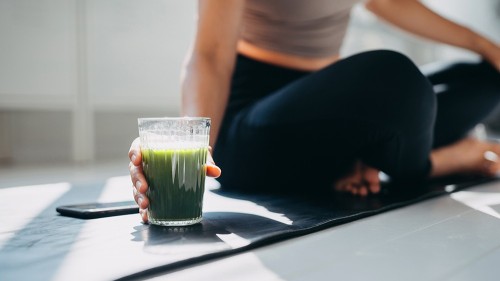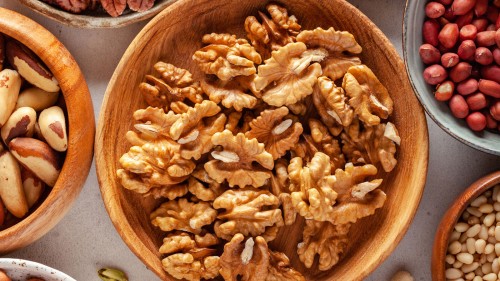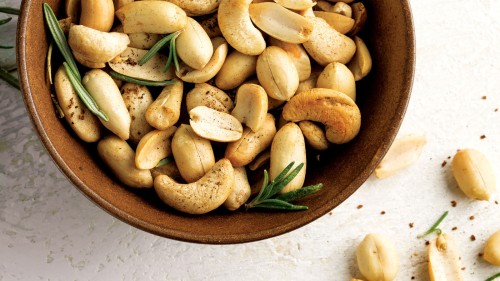A Dietitian Recommends Top 15 Foods That Give You More Energy (And Foods to Avoid)
Last Updated on February 5, 2024
Medically Reviewed by Anthony Dugarte, MD
Learn about the 15 top foods that boost your energy and what to avoid to prevent fatigue and crashes.


Key Highlights
- Consuming foods high in protein, healthy fats, and complex carbohydrates can help provide steady energy throughout the day rather than quick bursts followed by crashes.
- Foods like almonds, salmon, oatmeal, eggs, sweet potatoes, and beans are excellent options for sustained energy.
- It's best to avoid sugary baked goods, candy, fried foods, and overly processed items, which may initially spike blood sugar but lead to fatigue afterward.
- Staying adequately hydrated, getting enough exercise, managing stress, and getting quality sleep are other critical factors for maintaining good energy levels.
Feeling sleep-deprived and bleary-eyed? Unfortunately, many people struggle to make it through a long workday, particularly through the dreaded afternoon slump.
You may be tempted to hit the vending machine for an energy booster during these times, but beware. These sugar-laden snacks may provide a quick jolt of energy, but after that initial spike, they’ll leave you feeling fatigued and famished all over again.
Foods that give you energy are usually not high in sugar. Instead, they are rich in protein and complex carbohydrates. Rather than leaving you hungry and tired, high-energy food will provide a natural boost to help you get through even your most tiring days.
Here are a few of my personal favorites:
1. Almonds
If you’re looking for foods that give you energy, look no further than a handful of almonds.
According to research, almonds are one of the most nutrient-dense foods. They contain healthy fats and are a good source of protein and fiber. (1)
They will also provide you with many other essential vitamins and minerals. A handful of almonds has about 6 grams of protein which will help sustain your energy levels throughout the day.
2. Salmon
Salmon and other fatty fish are excellent sources of protein and omega 3 fatty acids in addition to vitamin B12.
Vitamin B12 helps to give you energy by converting the food you eat into glucose. Additionally, one study showed that people deficient in vitamin B12 are more prone to fatigue and diminished energy. (2)
Omega 3 fatty acids may also help boost your brain as you’re slogging away at your desk.
Researchers in one study found that omega-3 fatty acids may improve attention and memory. (3)
3. Blueberries
This superfood certainly lives up to the hype. Blueberries are packed with powerful antioxidants that may help increase energy and boost mental agility.
A recent review found that blueberries may benefit memory and executive functioning in children and adults. (4)
A 2020 study from Advances in Nutrition suggested that blueberries' anti-inflammatory and antioxidant properties may mitigate the risk of many diseases, all while promoting healthy aging. (5)
4. Greek Yogurt
Greek yogurt is chock-full of energy-sustaining protein. Moreover, the carbohydrate found in Greek yogurt is less likely to spike your blood sugar, giving you an even keel of energy throughout the day.
Greek yogurt may also benefit your waistline. One study found that an afternoon snack of Greek yogurt led to reduced hunger, increased fullness, and reduced subsequent calorie intake compared to a lower protein snack. (6)
5. Popcorn
Rich in whole grains, popcorn contains a ton of energy-boosting fiber and is low in calories.
Popcorn also falls relatively low on the glycemic index, which means it will take longer to digest and won’t spike your blood sugar as other simple carbohydrates will.
One study ranked popcorn as one of the top energy-boosting snacks. (7)
Steer clear from the popcorn smothered in butter and salt. Instead of butter or margarine, try topping your popcorn with olive oil or avocado oil, which have antioxidants and heart-healthy monounsaturated fats.
6. Oatmeal
The whole grains found in oatmeal contain complex carbohydrates, which will provide a steady release of energy throughout the day.
Oatmeal may have other far-reaching health benefits. According to researchers, oats may play an important role in increasing the feeling of fullness, improving diet quality, and enhancing digestive and cardiovascular health. (8)
7. Eggs
A simple yet natural energy booster, eggs are packed with protein, providing a steady and sustained energy source throughout your day.
Eggs are rich in other nutrients, including thiamin, riboflavin, folate, B12, and B6. These B vitamins are responsible for helping to break down food for increased energy.
8. Green Tea
Green tea is a natural energy food as it contains some caffeine. However, it won’t likely cause the jittery side effects associated with most coffee drinks.
Green tea also has the added benefit of containing the amino acid L-theanine.
According to research, L-theanine and the caffeine found in green tea can help improve brain functioning. (9)
9. Water
One simple way to increase energy levels is by drinking more water.
Being even slightly dehydrated can diminish your physical and mental energy, reducing your ability to concentrate.
According to the National Academy of Medicine, an adequate intake of daily fluids is 13 cups (104 ounces) for men and 9 cups (72 ounces) for women. (10)
Your water intake should be higher if you are physically active or live in a warm climate.
10. Avocados
Avocados offer an impressive nutrient profile. They are loaded with more than 20 vitamins, minerals, and antioxidants and contain an excellent source of heart-healthy unsaturated fats.
According to one study, avocados are also rich in dietary fiber, providing you with sustained energy levels throughout the day. (11)
11. Sweet Potatoes
Sweet potatoes are packed with an abundance of vitamins, minerals, fiber, and phytonutrients (natural compounds produced by plants), all of which can enhance both your body and mind.
This energy-boosting food contains soluble fiber, which can slow your body’s absorption of carbohydrates and help prevent spikes in blood sugar.
12. Quinoa
Quinoa, a whole grain, is another superfood offering an array of important nutrients.
This high-protein plant food contains all nine essential amino acids and is high in fiber, magnesium, B vitamins, iron, potassium, calcium, phosphorus, vitamin E, and antioxidants.
The rich protein and slow-release carbohydrates in quinoa make it a natural energy food that keeps you awake and alert throughout your day.
13. Beans
Beans are protein-rich and contain complex carbohydrates giving you an ideal combination of nutrients to help boost your energy throughout the day.
The high levels of vitamin B found in beans will also help your body turn food into energy. (12)
14. Spinach
Spinach is considered an energy-boosting food as it packs a powerful punch of many vitamins and minerals.
The iron found in spinach helps create hemoglobin which is responsible for bringing oxygen to your body’s tissues.
Having adequate iron stores will help prevent fatigue and will increase mental and physical stamina.
15. Hummus
Hummus is a popular Mediterranean dish made from chickpeas, sesame seed paste, olive oil, and lemon juice.
Hummus is a rich source of protein that will help balance your blood sugars and prevent hunger cravings throughout the day.
Additionally, the iron found in the chickpeas will provide an extra boost of natural energy to help keep you awake and alert as you work.
Foods to Avoid
While many foods give you energy, some may give you a momentary boost, which will only send you crashing later.
These foods include:
- Baked goods like cookies, cupcakes, and muffins
- Candy bars
- Fried foods
- Overly processed and fast food
- Energy drinks
Increasing your energy levels will require focusing on energy-boosting foods.
While reaching for a candy bar or pastry is tempting, the impending sugar crash will leave you feeling tired and hungry.
Fatigue Signs and Safety Concerns
Fatigue may be simply a result of not sleeping well, but persistent fatigue may be a sign of something more serious.
If you’re experiencing chronic, persistent fatigue, it’s important to speak with a healthcare professional to rule out medical conditions like anemia, depression, or sleep apnea, among others.
Signs and symptoms that you may need to change your diet may include difficulty concentrating, frequent headaches, and bowel irregularities, including gas, bloating, diarrhea, or constipation.
A healthcare professional, specifically a registered dietitian, can help manage various symptoms through diet and lifestyle changes.
The Bottom Line
Foods that give you energy consist of complex carbohydrates, protein, and healthy fats, providing a sustained stream of energy to ensure you’re as healthy and productive as possible.
But having enough energy isn’t just about the foods you eat. Regular exercise, stress management, and sleep can all help as well.
A healthy lifestyle is the best way to improve your energy so you can power through your day.
Here Are Some Practical Steps to Increase Energy
If you want to add more of these high-energy foods into your day, here are my suggestions:
- Always start your day with a healthy breakfast. A great breakfast is a cup of green tea and oatmeal with fresh blueberries. Or you could have scrambled eggs with spinach to kickstart your day with a protein and nutrient-rich meal.
- If you need a mid-morning snack, a handful of almonds or Greek yogurt will likely give you a nice boost of energy and keep you feeling satisfied until lunch.
- Be mindful of your lunch choices by incorporating whole grains like quinoa into the meal. Whole grains will take longer to digest, leaving blood sugar stable and your energy levels optimal.
- For dinner, try swapping out meat for a piece of salmon or a plant-based bean burger. Both will leave you feeling energized due to their array of B-vitamins.
- Lastly, invest in a decent water bottle and make a habit of sipping on water throughout the day. Staying hydrated is one of the most important aspects of staying energized.
At WellnessVerge, we only use reputable sources, including peer-reviewed medical journals and well-respected academic institutions.
- Health benefits of nut consumption:
https://pubmed.ncbi.nlm.nih.gov/22254047/ - Vitamins and Minerals for Energy, Fatigue and Cognition: A Narrative Review of the Biochemical and Clinical Evidence:
https://www.ncbi.nlm.nih.gov/pmc/articles/PMC7019700/ - Effects of ω-3 fatty acids on cognitive performance: a meta-analysis:
https://pubmed.ncbi.nlm.nih.gov/22305186/ - Systematic Review of the Effects of Blueberry on Cognitive Performance as We Age:
https://pubmed.ncbi.nlm.nih.gov/30941401/ - Recent Research on the Health Benefits of Blueberries and Their Anthocyanins:
https://academic.oup.com/advances/article/11/2/224/5536953 - Low, moderate, or high protein yogurt snacks on appetite control and subsequent eating in healthy women:
https://pubmed.ncbi.nlm.nih.gov/23022602/ - Food Sources of Energy and Nutrients among Children in the United States: National Health and Nutrition Examination Survey 2003–2006:
https://www.mdpi.com/2072-6643/5/1/283 - Oats, more than just a whole grain: an introduction:
https://www.cambridge.org/core/journals/british-journal-of-nutrition/article/oats-more-than-just-a-whole-grain-an-introduction/16E593B6FC52969FAF4E295BCE2C5109 - A double-blind, placebo-controlled study evaluating the effects of caffeine and L-theanine both alone and in combination on cerebral blood flow, cognition and mood:
https://www.ncbi.nlm.nih.gov/pmc/articles/PMC4480845/ - Dietary Reference Intakes for Water, Potassium, Sodium, Chloride, and Sulfate (2005) Chapter: 4 Water:
https://www.nap.edu/read/10925/chapter/6#102 - Hass Avocado Composition and Potential Health Effects:
https://www.ncbi.nlm.nih.gov/pmc/articles/PMC3664913/ - Legumes: Health Benefits and Culinary Approaches to Increase Intake:
https://www.ncbi.nlm.nih.gov/pmc/articles/PMC4608274/






